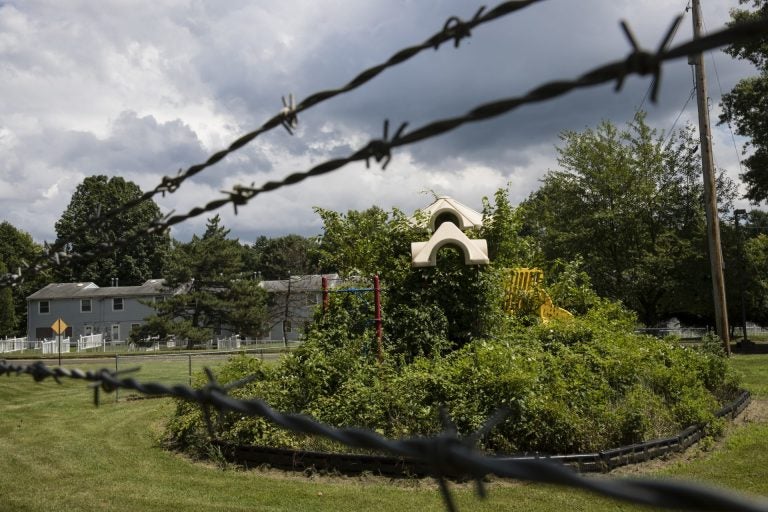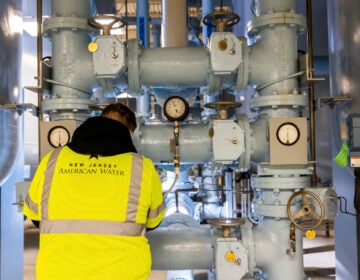New Jersey DEP says it’s working with chemical companies to curb PFAS
After a scathing letter from companies, officials said they hope for a voluntary resolution to contamination.

In this Aug. 1, 2018 photo weeds engulf a playground at housing section of the former Naval Air Warfare Center Warminster in Warminster, Pa. In Warminster and surrounding towns in eastern Pennsylvania, and at other sites around the United States, the foams once used routinely in firefighting training at military bases contained per-and polyfluoroalkyl substances, or PFAS. (Matt Rourke/AP Photo)
This article originally appeared on NJ Spotlight.
—
Environmental officials indicated on Monday that they are working toward an agreement with five chemical companies that were accused earlier this year of contaminating the environment with toxic PFAS chemicals in many parts of New Jersey.
The Department of Environmental Protection responded to a newly published letter from the companies which said they could not comply with a DEP directive to pay for the investigation and cleanup of the chemicals because the order was too broad to be effective.
The companies also said it would be “wildly expensive” to even assess the costs of the cleanup sought by the directive, which the DEP said was the first of its kind in the nation.
DEP changes its tone
While the DEP sharply criticized the companies in the March directive, saying they were responsible for “significant PFAS contamination” across the state, it was more conciliatory in a statement on Monday afternoon.
“In response to the directive, we have met with several of the companies and received certain documentation and are hopeful we can continue working with the subject companies to reach a voluntary resolution to address statewide PFAS investigation and remediation without the need for further costly, protracted legal action,” the department said.
But it dismissed arguments by the companies that it had exceeded its legal authority in issuing the directive to Solvay Specialty Polymers, Solvay Solexis, E.I. Dupont de Nemours, DowDupont, Dupont Specialty Products, Chemours, and 3M.
Attorneys for two of the companies said in the letter to DEP Commissioner Catherine McCabe that the directive was too broad to be tenable because it called for the cleanup of certain per- and polyfluoroalkyl substances (PFAS) from “New Jersey’s environment” without being more specific.
The letter, dated April 17, was first published by Bloomberg News, which obtained it through a request under New Jersey’s Open Public Records Act.
The directive followed the DEP’s nation-leading implementation of strict health standards for three of the chemicals in drinking water and groundwater amid growing concern that they are a threat to public health. The chemicals, formerly used in consumer products like nonstick cookware, are linked to health conditions including cancer, low birth weights, and high cholesterol.
Companies have their say
In their letter, the companies acknowledged that they continue to monitor and clean up contamination at specific sites such as Chambers Works in Salem County and Parlin in Middlesex County, but said the DEP had not explained how those locations, and others, were linked to statewide contamination.
Last year, the state issued consumption advisories on fish that were found to contain the chemicals at 10 sites. By June 2018, 284 private wells out of 992 sampled had PFOA (perfluorooctanoic acid), one of the PFAS family, at above the health limit, while 40 exceeded the limit for another chemical, PFOS (perfluorooctanesulfonic acid).
“The directive does not suggest how purported discharges at Chambers Works or Parlin could reasonably be linked to statewide contamination,” the letter said. It argued that the DEP hasn’t received authority from the Legislature or the courts to impose its plan.
It scorned the DEP’s demand for the companies to estimate the cost of investigation and cleanup within 30 days, saying it is “clearly impracticable if not downright impossible” to produce estimates for just one site within that time, let alone for the whole state.
No insight into costs
And it said that even estimating the cost of a statewide project demanded by the DEP would be “wildly expensive” because it would require input from many experts in fields such as science, economics, and accounting.
The companies said they interpret the letter as an invitation to meet — which they said they are willing to do — rather than an instruction to fund anything because the directive is “not capable of compliance.”
One of the companies, Solvay Specialty Polymers, issued an individual statement, saying it has been cleaning up its site at West Deptford in Gloucester County since 2013 and has offered to reimburse the DEP for its work there. The company did not make PFAS chemicals at the South Jersey site but used one of them there until phasing it out voluntarily in 2010.
But Solvay, too, rejected the DEP’s assertion that it was responsible for PFAS contamination in other areas of the state and urged the DEP to investigate other sources, including those near the Solvay plant.
The company said its cleanup has included sampling public water systems as well as private wells and monitoring groundwater wells and soils. Even when companies have stopped using the chemicals, they remain a threat because they don’t break down in the environment.
Ed Lloyd, an environmental law professor at Columbia University, said the DEP has broad statutory authority to regulate air and water quality, and is within its rights to exercise that in trying to curb PFAS chemicals, even if it doesn’t yet have all the information it needs to impose specific cleanup requirements at specific sites.
Opening a conversation
To get that information, DEP is seeking to start a conversation with the companies, and has succeeded in doing so now that the companies have agreed to meet, Lloyd said.
“They are saying the DEP doesn’t have authority to do this, but they also say they want to cooperate,” he said. “The companies need to collect the information upon which to make a judgment about the next steps. This is an iterative process. I think it’s fair to say it’s working.”
Because of its industrial heritage, New Jersey has higher rates of PFAS contamination than many other states, and DEP is using its directive to regulate that, Lloyd said.
“They do have data that this is a statewide problem, and for them to go to the people who were manufacturing it and say, ‘Until we know better, you’re liable for it,’ is not premature,” he said.
WHYY is your source for fact-based, in-depth journalism and information. As a nonprofit organization, we rely on financial support from readers like you. Please give today.




